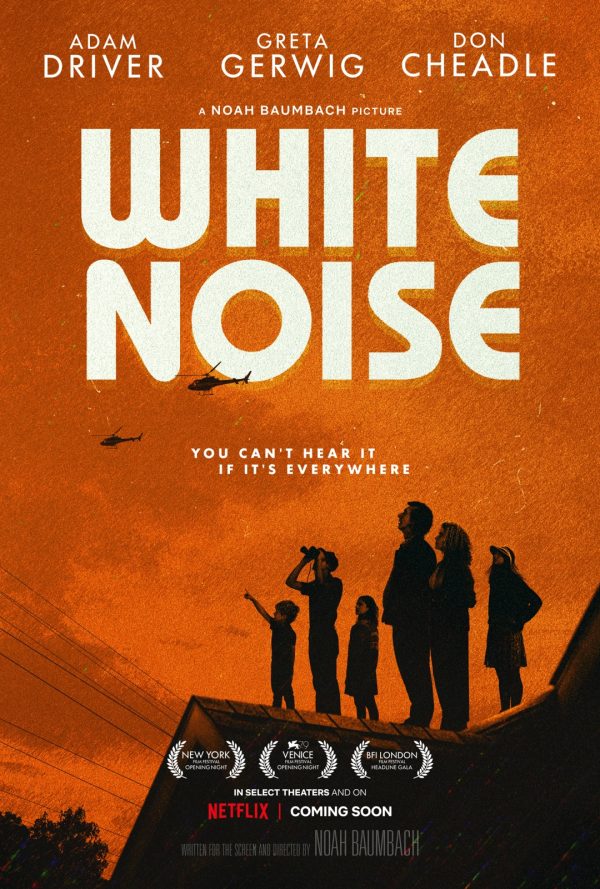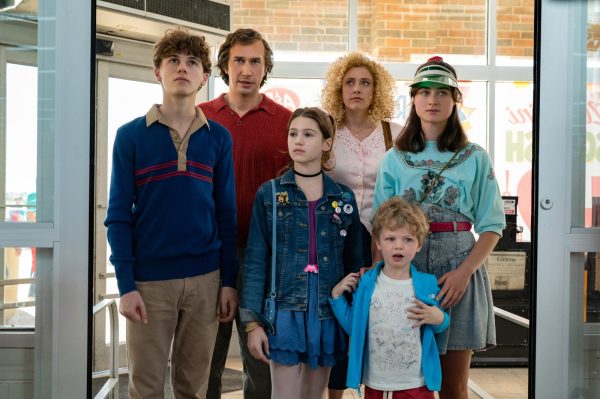White Noise, 2022.
Directed by Noah Baumbach.
Starring Adam Driver, Greta Gerwig, Raffey Cassidy, Sam Nivola, May Nivola, Don Cheadle, Jodie Turner-Smith, André 3000, Lars Eidinger, Barbara Sukowa, Mike Gassaway, Matthew Shear, Francis Jue, Danny Wolohan, J. David Hinze, Logan Fry, Thomas W. Wolf, Bob Gray, Erik Moth, Bill Camp, and Gideon Glick.
SYNOPSIS:
Jack Gladney, professor of Hitler studies at The-College-on-the-Hill, husband to Babette, and father to four children/stepchildren, is torn asunder by a chemical spill from a rail car that releases an “Airborne Toxic Event”, forcing Jack to confront his biggest fear – his own mortality.
Laying in bed, the married couple, Jack and Babbette Gladney (played by Adam Driver and Greta Gerwig), at the center of Noah Baumbach’s (his second collaboration with Netflix following the extraordinarily emotional Marriage Story) adaptation of Don DeLillo’s revered and supposedly unfilmable novel White Noise, engage in a conversation about death, hoping that they pass on first, stating that life without each other would be unbearable.
One’s mileage for involvement will also vary on an attachment to that theme, particularly because the unfilmable part of White Noise doesn’t boil down to visual trickery but the ability to embrace intentionally bizarre and genre-shifting narrative structure (although there is a sense that the middle section would have benefited from a filmmaker more strongly versed in sci-fi and evoking spectacle).
White Noise is broken into three chapters, with the first functioning as something resembling a dark sitcom, then veering into a brush with a pandemic resulting from a chemical-spilling truck accident, and finally settling into a more dramatic exploration of husband and wife through their secrets and desperation to overcome the fear of death. It’s a rare film that begins an unwieldy mess but reigns the best of those elements into a profound finale tackling everything from jealousy to rage to consumerism to family to death to a highly intriguing interpretation of the purpose of faith.
However, it’s also difficult to work up praise for White Noise beyond that third act, where it feels like Noah Baumbach is fully locked into his wheelhouse, balancing the serious with the absurd (a violent scenario skillfully transitions into black comedy). There are horror elements here (including a fake-out nightmare sequence that the filmmaker should be above, even if it is somewhat chilling) and a pandemic filled with misinformation through technology similar to modern-day life (the film approximately takes place in 1985).
More fascinatingly, the script and novel make the case that the biggest source of false information comes from family and general miscommunication, which makes it slightly frustrating that the four children (three of which are Jack’s stepchildren) never truly break through as fully fleshed-out characters, as they seem wiser and unafraid to push the parents into confronting certain realities. Adam Driver is also outstanding at playing a character who is simultaneously afraid of death but comfortable pretending nothing bad will ever happen and disrupt the family life he appreciates.
Barring a thrilling juxtaposition breaking down the similar relationship between Adolf Hitler and Elvis Presley to their moms that cuts back and forth between a drunk driver transporting the toxic chemicals, the various friendships on-screen between Jack, a Hitler studies college professor, also don’t tie into the film and characters with the same verve as it’s more thoughtful stretches.
Don Cheadle plays fellow teacher Murray Siskind, who comes up with the above-mentioned studies comparison, while the presence of Jodie-Turner Smith as the college scientist is also welcome. They all have philosophical musings (Murray suggests that grocery shopping is a form of rebirth, which leads to an amusing ending credits sequence that sees Noah Baumbach tackling yet another genre in this nearly indescribable experience) but rarely feel like human beings worth caring about (at least not to the same degree as Jack and Babbette).
Speaking of Greta Gerwig’s Babbette, it’s also mildly disappointing that her entire character boils down to hiding a secret in that teenage daughter Denise (Raffey Cassidy) has caught on to her experiencing memory loss and discovered mysterious medication unlisted with doctors and medical professionals. Once the intended treatment for that drug comes into play and how it affects these characters is brought to the forefront, White Noise finally cuts through all the white noise and ties itself together thematically.
Then again, maybe this is the best possible version of White Noise, a loaded idiosyncratic experience for which Noah Baumbach hasn’t fully found the right frequency. Not to be corny with words, but most of it is forgettable static until then.
Flickering Myth Rating – Film: ★ ★ / Movie: ★ ★ ★
Robert Kojder is a member of the Chicago Film Critics Association and the Critics Choice Association. He is also the Flickering Myth Reviews Editor. Check here for new reviews, follow my Twitter or Letterboxd, or email me at MetalGearSolid719@gmail.com
















